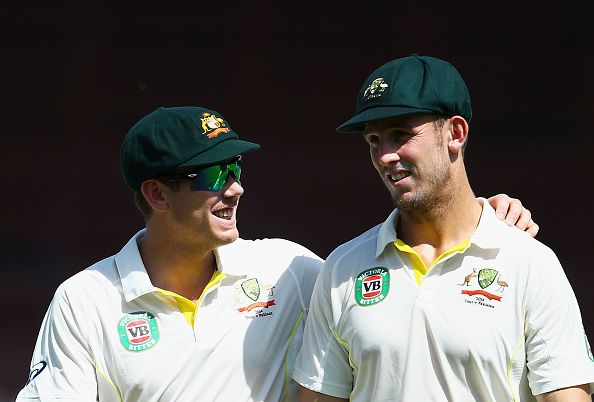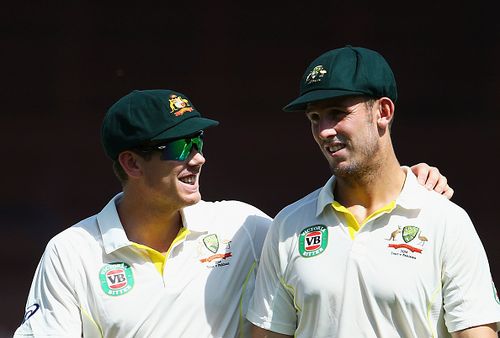
James Faulkner or Mitchell Marsh - Who will be Australia's next all-rounder?

With Shane Watson struggling for form with both bat and ball, the arguments will have already started around water coolers across the country about who our next all-rounder will be to play Test, One Day International (ODI) and Twenty20 cricket for the next decade.
It’s hard to compare all-rounders of the modern era with those of the past such as Richie Benaud, Jack Gregory and Keith Miller due to the enormous amount of 50-over and Tweny20 cricket played around the world today. But given Australia has produced only one truly great all-rounder in Miller, and we’ve enjoyed considerable success in all forms of the game throughout history, there’s an argument to suggest we don’t even need a great all-rounder, just a very good one.
We also happened to be blessed with a wonderful fast bowler who can bat a bit, so do we even need a very good all-rounder to fill the hole that will be eventually left by Watson in the short term? Mitchell Johnson has scored almost 2,000 Test runs (including a century) and almost taken 300 Test wickets, a feat, when achieved, that will put him in rare company. In the shorter forms of the game, his batting average is obviously much less, but he has scored many handy lower order runs at about a run a ball. But he is 33, and surely time isn’t on his side either.
In the shorter versions of the game, the requirement for a genuinely excellent all-rounder or two in the line-up in obvious, and Australia have an embarrassment of riches. Shane Watson, James Faulkner and Mitchell Marsh are three outstanding talents at varying points of their cricket careers, and no country comes close to having this sort of depth in this World Cup. And that’s without mentioning Glenn Maxwell who can bowl some handy spin and has 28 wickets at an average of 38.03 in ODIs.
Shane Watson is almost 34, has a checkered history with injury, which admittedly has been less frequent in his later years, and his light is slowly dimming on what has been an excellent international career. If he doesn’t have long to go, and all indications are he’s near the end, which of Faulkner or Marsh could step into the all-rounder role in all forms of the game?
Faulkner is just a year older than Marsh at 24, but it seems like he’s been around the state and international scene for a lot longer than his main rival. He has been Tasmania’s best player during their recent wonderful period of success, winning the Sheffield Shield competition in 2010/11 and 2012/13. During those three seasons, which included a losing Shield Final in 2011/12, he won three consecutive Ricky Ponting Medals.
He made his international debuts in both ODI and Twenty20 formats in 2013 and has been ever-present since. He has played 38 ODIs, with a batting average of 48.12 at a strike rate of 111.11, and has 50 wickets at 32.36. By anyone’s standards, they are quite simply remarkable figures. He has only played the one Test match, making 23 and 22 runs while taking six wickets, including 4-51, at an average of 16.33. It’s obviously early days in the longer form of the game, but that is a very good start.
From a young age, Marsh was destined for the Australian team. His father was an Australian opening batsmen, playing 50 Tests and 117 ODIs, before coaching the national team to the 1999 World Cup title. Mitch grew up in the Australian dressing room, and went on to captain the Australian under-19 team to victory in the 2010 World Cup in New Zealand.
He played state cricket for the first time at 17-years-of-age, the youngest player ever to play domestic one-day cricket in Australia. He made his Twenty20 international debut as a 19-year-old in 2011, before making his Test debut in 2014 against Pakistan in the UAE, making 47 and 87.
At 23, Marsh has a long time ahead of him in the game. In 15 ODIs, he averages 36.91, and has taken 11 wickets, while his Test and Twenty20 international careers have only just begun having played just four and three games respectively. He is young and raw, but with an incredible amount of talent and the world at his feet. In the first game of this World Cup he smashed 23 runs off just 20 balls, and then took 5-33 to send England packing in an ominous warning to the rest of the competition.
Given his experience you’d have to think James Faulkner is the heir apparent to Shane Watson’s title of Australian cricket’s number one all-rounder, if he isn’t there already. But in Mitchell Marsh he has an understudy who has the talent to forge his own long and successful international career in all forms of the game. It’s going to be interesting, and a lot of fun, to see which of these two young, exciting all-rounders emerges as the number one over the next 10 years.
This article is a guest post by Patrick Gibson, a freelance writer and avid sports fan currently working for Betfair. He covers a variety of sports related topics ranging from soccer, cricket, and rugby.